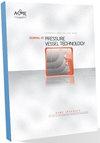Study On the Residual Stress Distribution of Bi-directional Cold Expansion Process Performed On Open Holes
IF 1.4
4区 工程技术
Q4 ENGINEERING, MECHANICAL
Journal of Pressure Vessel Technology-Transactions of the Asme
Pub Date : 2023-03-21
DOI:10.1115/1.4062179
引用次数: 0
Abstract
Traditional unidirectional cold expansion technology usually generates non-uniform distribution of residual stress in the thickness direction of holes, which is harmful to the improvement of fatigue life of holes. The present work proposed a bi-directional cold expansion procedure to realize the homogenization of residual stress in the thickness direction of the cold expanded hole, thereby further improved anti-fatigue performance of cold expanded hole. For this aim, a series of finite element (FE) simulations were carried out to investigate the effectiveness of the bi-directional cold expansion procedure and optimize the process parameters. The results showed that the optimized bi-directional cold expansion process generated a more uniform distribution of residual circumferential compressive stress in the thickness direction comparing to the simplified bi-directional cold expansion process using a single mandrel. For the Aluminium alloy 7050-T7451, when the first interference level I1=1.8%, the largest and the most uniform residual circumferential compressive stress was achieved, which suggested the best anti-fatigue performance.开孔双向冷扩过程残余应力分布研究
传统的单向冷胀工艺通常会在孔的厚度方向产生不均匀的残余应力分布,不利于提高孔的疲劳寿命。本工作提出了一种双向冷扩工艺,实现了冷扩孔厚度方向残余应力的均匀化,从而进一步提高了冷扩孔的抗疲劳性能。为此,进行了一系列的有限元模拟,研究了双向冷胀工艺的有效性,并对工艺参数进行了优化。结果表明:优化后的双向冷胀工艺比简化后的单芯筒双向冷胀工艺在厚度方向上产生的残余周向压应力分布更均匀;对于7050-T7451铝合金,当第一干涉电平I1=1.8%时,残余周向压应力最大且最均匀,抗疲劳性能最佳。
本文章由计算机程序翻译,如有差异,请以英文原文为准。
求助全文
约1分钟内获得全文
求助全文
来源期刊
CiteScore
2.10
自引率
10.00%
发文量
77
审稿时长
4.2 months
期刊介绍:
The Journal of Pressure Vessel Technology is the premier publication for the highest-quality research and interpretive reports on the design, analysis, materials, fabrication, construction, inspection, operation, and failure prevention of pressure vessels, piping, pipelines, power and heating boilers, heat exchangers, reaction vessels, pumps, valves, and other pressure and temperature-bearing components, as well as the nondestructive evaluation of critical components in mechanical engineering applications. Not only does the Journal cover all topics dealing with the design and analysis of pressure vessels, piping, and components, but it also contains discussions of their related codes and standards.
Applicable pressure technology areas of interest include: Dynamic and seismic analysis; Equipment qualification; Fabrication; Welding processes and integrity; Operation of vessels and piping; Fatigue and fracture prediction; Finite and boundary element methods; Fluid-structure interaction; High pressure engineering; Elevated temperature analysis and design; Inelastic analysis; Life extension; Lifeline earthquake engineering; PVP materials and their property databases; NDE; safety and reliability; Verification and qualification of software.

 求助内容:
求助内容: 应助结果提醒方式:
应助结果提醒方式:


